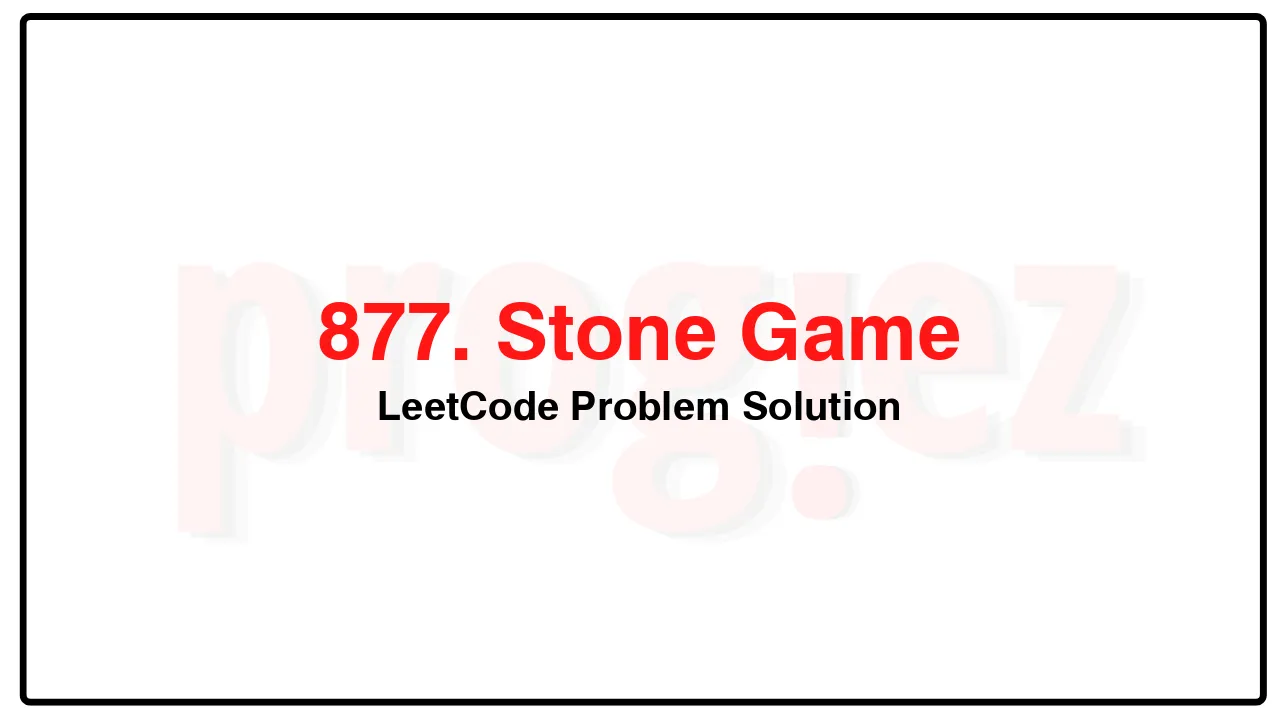877. Stone Game LeetCode Solution
In this guide, you will get 877. Stone Game LeetCode Solution with the best time and space complexity. The solution to Stone Game problem is provided in various programming languages like C++, Java, and Python. This will be helpful for you if you are preparing for placements, hackathons, interviews, or practice purposes. The solutions provided here are very easy to follow and include detailed explanations.
Table of Contents
- Problem Statement
- Complexity Analysis
- Stone Game solution in C++
- Stone Game solution in Java
- Stone Game solution in Python
- Additional Resources

Problem Statement of Stone Game
Alice and Bob play a game with piles of stones. There are an even number of piles arranged in a row, and each pile has a positive integer number of stones piles[i].
The objective of the game is to end with the most stones. The total number of stones across all the piles is odd, so there are no ties.
Alice and Bob take turns, with Alice starting first. Each turn, a player takes the entire pile of stones either from the beginning or from the end of the row. This continues until there are no more piles left, at which point the person with the most stones wins.
Assuming Alice and Bob play optimally, return true if Alice wins the game, or false if Bob wins.
Example 1:
Input: piles = [5,3,4,5]
Output: true
Explanation:
Alice starts first, and can only take the first 5 or the last 5.
Say she takes the first 5, so that the row becomes [3, 4, 5].
If Bob takes 3, then the board is [4, 5], and Alice takes 5 to win with 10 points.
If Bob takes the last 5, then the board is [3, 4], and Alice takes 4 to win with 9 points.
This demonstrated that taking the first 5 was a winning move for Alice, so we return true.
Example 2:
Input: piles = [3,7,2,3]
Output: true
Constraints:
2 <= piles.length <= 500
piles.length is even.
1 <= piles[i] <= 500
sum(piles[i]) is odd.
Complexity Analysis
- Time Complexity: O(n^2)
- Space Complexity: O(n^2)
877. Stone Game LeetCode Solution in C++
class Solution {
public:
bool stoneGame(vector<int>& piles) {
const int n = piles.size();
// dp[i][j] := the maximum stones you can get more than your opponent in
// piles[i..j]
vector<vector<int>> dp(n, vector<int>(n));
for (int i = 0; i < n; ++i)
dp[i][i] = piles[i];
for (int d = 1; d < n; ++d)
for (int i = 0; i + d < n; ++i) {
const int j = i + d;
dp[i][j] = max(piles[i] - dp[i + 1][j], piles[j] - dp[i][j - 1]);
}
return dp[0][n - 1] > 0;
}
};
/* code provided by PROGIEZ */877. Stone Game LeetCode Solution in Java
class Solution {
public boolean stoneGame(int[] piles) {
final int n = piles.length;
// dp[i][j] := the maximum stones you can get more than your opponent in piles[i..j]
int[][] dp = new int[n][n];
for (int i = 0; i < n; ++i)
dp[i][i] = piles[i];
for (int d = 1; d < n; ++d)
for (int i = 0; i + d < n; ++i) {
final int j = i + d;
dp[i][j] = Math.max(piles[i] - dp[i + 1][j], piles[j] - dp[i][j - 1]);
}
return dp[0][n - 1] > 0;
}
}
// code provided by PROGIEZ877. Stone Game LeetCode Solution in Python
class Solution:
def stoneGame(self, piles: list[int]) -> bool:
n = len(piles)
# dp[i][j] := the maximum stones you can get more than your opponent in piles[i..j]
dp = [[0] * n for _ in range(n)]
for i, pile in enumerate(piles):
dp[i][i] = pile
for d in range(1, n):
for i in range(n - d):
j = i + d
dp[i][j] = max(piles[i] - dp[i + 1][j],
piles[j] - dp[i][j - 1])
return dp[0][n - 1] > 0
# code by PROGIEZAdditional Resources
- Explore all LeetCode problem solutions at Progiez here
- Explore all problems on LeetCode website here
Happy Coding! Keep following PROGIEZ for more updates and solutions.